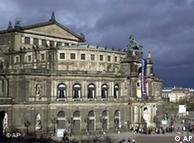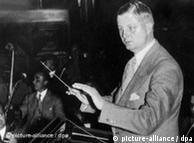In S.F., Francesca Zambello completes 'Ring'
Siegfried dropped his glass and swaggered toward the couch. Gutrune eyed him knowingly as he moved in and perched above her.
 |
Photo: Liz Hafalia
|
The director, watching from her rehearsal hall chair, offered a suggestion. "What happens if you just fall right over her?" asked Francesca Zambello.
Ian Storey, who's playing Siegfried in San Francisco Opera's new production of Richard Wagner's "Götterdämmerung," tried the tumble a few times. It didn't feel right to him. He got back on the couch and repositioned himself, looking down the body of Melissa Citro, cast as Gutrune, instead of into her face.
Zambello nodded her approval as Storey ran his hands up onto Citro's knees and thighs. "Legs do it for all of them," the director said. "I like it."
After a few more takes, Zambello asked if everyone was comfortable with what they'd just accomplished before continuing the scene. A pianist churned on through the score. Forty minutes later, the rehearsal hall, one of three in use that afternoon, was reconfigured for a duet from "Siegfried" with Brünnhilde (Nina Stemme) and a younger Siegfried (Jay Hunter Morris) clambering around on some rocks.
Zambello has been doing a lot of these hairpin turns, working 12 hours a day seven days a week to get all four operas of "Der Ring des Nibelungen" ready for the company's deluxe Wagner summer season at the War Memorial Opera House. Opening today with the local production premiere of "Siegfried," followed by the premiere of this "Götterdämmerung" on June 5, the season features three complete "Ring" cycles, each one compressed into a single week (June 14-July 3).
A broken ankle, which required a brace, wasn't about to slow the single-minded Zambello down. Brisk and straightforward, she brushed off any concerns about her enormous task. "We've got a battle plan," she said in a dinner-break interview, ignoring a boxed salad. "Once you've got the whole thing in your head, you don't get lost. You focus on what's in front of you."

Known for her ability to balance the sweeping view with telling psychological and emotional details, Zambello is finally about to reveal the full scope of an American-setting "Ring" that's been in the works for a decade. She and San Francisco Opera General Director David Gockley first discussed the idea when he was still running the Houston Grand Opera. When financial woes scuttled an American "Ring" in Texas, Zambello found a new home for the idea at the Washington National Opera, which mounted "Das Rheingold" in 2005 and "Die Wälkure" in 2007. But the D.C. company, too, was destined not to see the entire project through.
Now, despite its own financial constraints, it's San Francisco that will realize the full vision of a "Ring" that invokes everything from the California Gold Rush and a gleaming 1930s Manhattan skyline to bleak freeway overpasses and the winged Valkyries as Amelia Earhart-styled aviatrices parachuting in from above.

Local audiences got their first sense of Zambello's American "Ring" when "Das Rheingold" played here in 2008. "Die Wälkure" followed in 2010.
Her "Siegfried," the director said, "comes out of the American spirit of the outsider, whether it's Jack Kerouac or James Dean - the kind of free spirit who knows no boundaries." As for "Götterdämmerung," it will be set in a near future "when the actions of the characters have destroyed the natural order, and we've come to a time of such corruption that cannot be restored except by Brünnhilde's self-sacrifice. I see it as a time where all nature is dead." (
more)
Continue Reading...
All images Lea Suzuki unless indicated otherwise
 If you wish to try it out, go directly to the TSO "subscribe to email" page by clicking here (direct url: http://www.tso.ca/Plan-Your-Experience/EMail-Club.aspx.
If you wish to try it out, go directly to the TSO "subscribe to email" page by clicking here (direct url: http://www.tso.ca/Plan-Your-Experience/EMail-Club.aspx.




















atkibblepalace,glasgowbotanicgardenscredittommyga-kenwan.jpg)




